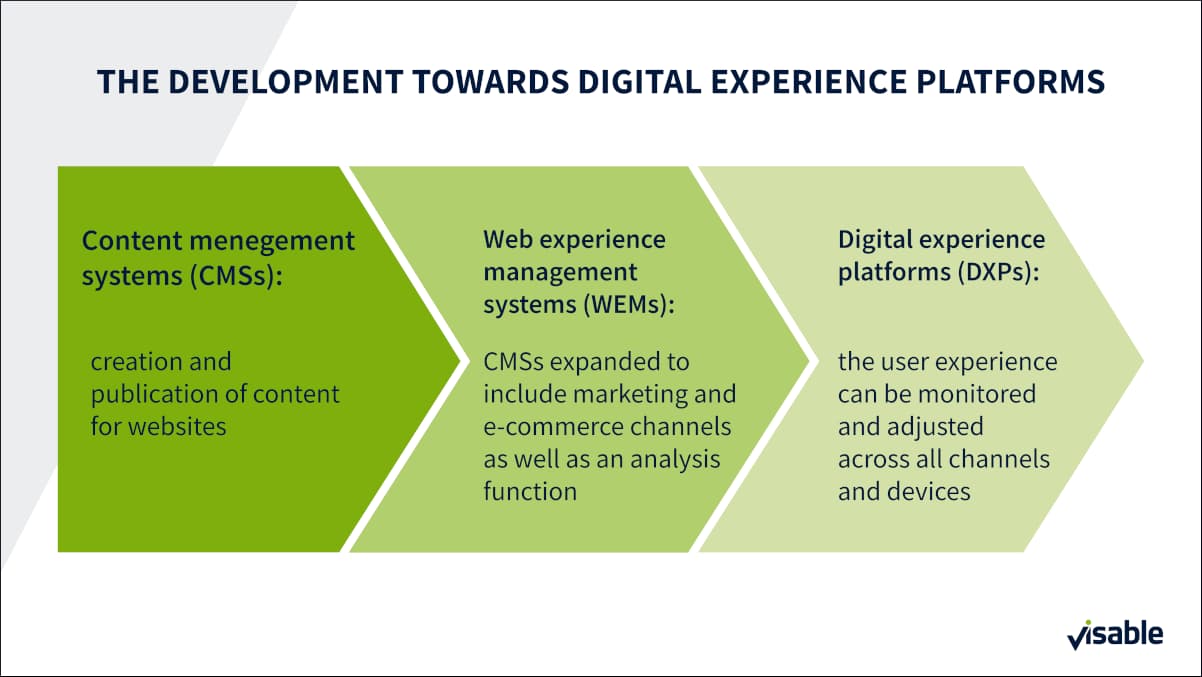B2B customers have many options today for informing themselves. They not only use various online references, but frequently also several digital end devices. This makes it more difficult to follow the customer journey. The solution: digital experience platforms (DXPs).

What is a digital experience platform?
A digital experience platform follows the interactions of visitors to websites and social media channels, amongst others, and collects the data of these interactions to bring everything together – regardless of the hardware being used. This makes it possible, for instance, to follow the experience of each individual person, to manage it and to use it for B2B marketing.
The aim in this case is to improve the customer journey and the customer experience – while leveraging targeted communications for individual customers, business partners and interested person to generate more conversions. This is achieved through a DXP interface to many tools (e.g. CRM and ERP systems) which collect these data. The data is then prepared and forwarded to the central hub for further analysis and handling.
Benefits and key components of a DXP
Digital experience platforms are based on content management and Web experience management systems. The evolution looks roughly like this:
- Content management systems (CMSs) let you generate and publish content for websites (PC and mobile).
- Web experience management systems (WEMs) expand the possibilities of CMSs with the use of marketing and e-commerce channels. And they offer analysis functions.
- DXPs go one step further and enable you to completely observe and analyse the user experience via all channels and devices, to adapt content and edit it.

An essential task of DXP is to learn from every interaction and improve the customer journey with every visit. To achieve this, the platforms leverage ingenious algorithms, large-scale data libraries and artificial intelligence (AI). Ideally, the target groups can then be honed in on, individual offers created and then published on the best channels respectively.
This results in a two-fold effect: on the one hand, digital experience platforms (largely automatically) capture relevant information for the users; on the other hand, they read the users’ behaviour and get relevant information in turn. This gives you the following benefits:
- DXP helps companies to provide a uniform brand appearance across all touchpoints.
- The systems collect data based on users’ interactions and generates customer profiles which can be used for a largely tailored customer journey.
- All information is bundled in a single spot and is therefore available for all parties involved at the same time and in a transparent way.
- A DXP helps online marketing to plan projects flexibly and to execute campaigns with added value in a simplified and time-saving way at the same time for various touchpoints.
- Digital experience platforms can be integrated into IT structures and adapt to new requirements.
- Many providers also enable specific personalisation and automation tools, which can be used to show content specifically to the target group and in a performance-centric way.
What to pay attention to with DXP solutions
Digital experience platforms can be costly. For the best functionality, they have to be seamlessly and flawlessly integrated into the digital ecosystem of a company. Only in this way can they collect and handle the required data. What’s more, they have to be future-proof and as easy as possible to use. To make the work with them easier, you can organise trainings for your staff. This also accelerates the in-house acceptance of the technology.
On a functional level, a DXP is when the company uses scalable solutions for CMS, enterprise resource planning (ERP) and customer relationship management (CRM) that are connected to one another. Additionally implemented AI expands the range of functions, ensures more automatic processes, automatically recognises visitor trends, for instance, and reacts to these with the matching content and formats. This enables a digital experience platform to contribute significantly to ongoing content management.
